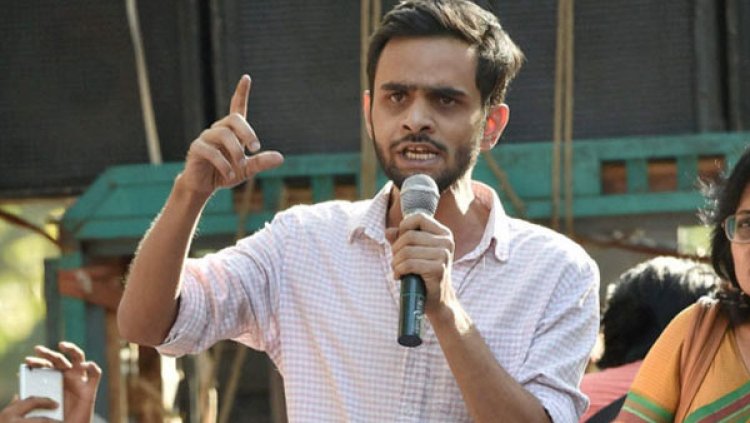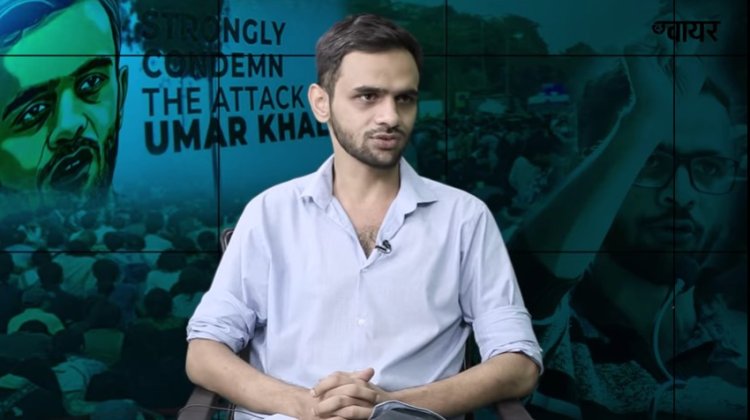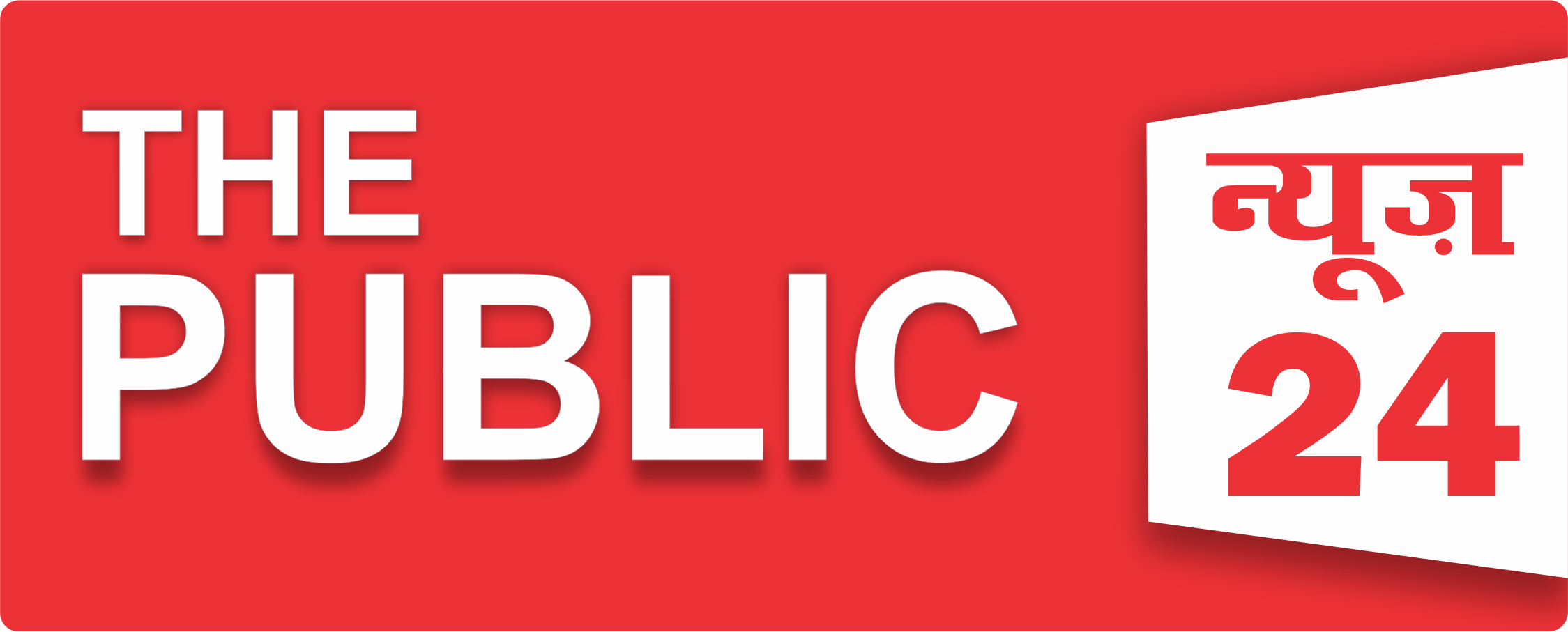उमर ख़ालिद की ज़मानत बार-बार ख़ारिज होने की क्या वजह है|
उमर ख़ालिद की ज़मानत ख़ारिज करने के फ़ैसले में अदालत यह कबूल कर रही है कि बचाव पक्ष के वकील पुलिस के बयान में जो असंगतियां या विसंगतियां दिखा रहे हैं, वह ठीक है.

उमर ख़ालिद की ज़मानत बार-बार ख़ारिज होने की क्या वजह है|

उमर ख़ालिद की ज़मानत ख़ारिज करने के फ़ैसले में अदालत यह कबूल कर रही है कि बचाव पक्ष के वकील पुलिस के बयान में जो असंगतियां या विसंगतियां दिखा रहे हैं, वह ठीक है. लेकिन फिर वह कहती है कि भले ही असंगति हो, उस पर वह अभी विचार नहीं करेगी. यानी अभियुक्त बिना सज़ा के सज़ा काटने को अभिशप्त है! उमर खालिद की जमानत की अर्जी खारिज किए जाने के बाद विशेष सरकारी वकील ने सार्वजनिक रूप से भय व्यक्त किया है कि अब ‘छात्र-एक्टिविस्ट’ के नाम पर उमर खालिद के पक्ष में अभियान चलाया जाएगा|
उमर खालिद की अर्जी को नामंजूर किए जाने के बाद कोई सार्वजनिक चर्चा शुरू हो, इसके पहले ही सरकारी वकील ने यह डर जाहिर किया कि उमर को छात्र बतलाकर उनके पक्ष में हमदर्दी पैदा करने की कोशिश की जाएगी| अव्वल तो उमर छात्र नहीं हैं और खुद को कहते भी नहीं. यह तो अखबार और बाकी मीडिया है जिसके पास उमर के लिए जवाहरलाल नेहरू विश्वविद्यालय के पूर्व छात्र के अलावा और कोई परिचय नहीं है. ऐसा क्यों हुआ इस पर हम कभी और विचार करेंगे|सरकारी वकील की शिकायत है जब इशरत जहां को जमानत मिली तो कहा गया कि कानून में विश्वास वापस लौटा है और अब जब और बाकियों की जमानत रद्द हो रही है तो आप छात्र-एक्टिविस्ट दुहाई देना शुरू करेंगे. अब वह वक्त है कि यह किस्सा शुरू किया जाएगा. हमें इससे सावधान रहना है.
सरकारी वकील अब अदालत के बाहर भी अभियुक्त के खिलाफ दलील रखेंगे और सार्वजनिक रूप से अनुमान लगाएंगे करेंगे कि आगे अभियुक्त अपने पक्ष में कौन से तर्क देगा. यानी वे अदालत एक बाहर भी अभियुक्त के विरुद्ध अभियान में अपना योगदान करेंगे. क्या यह काम सरकारी वकील का है? क्या उनकी विशेष दिलचस्पी इस मामले में है? क्या होनी चाहिए?
ये सवाल कोई नहीं करेगा. लेकिन किए जाने चाहिए अगर हमें याद है कि महाराष्ट्र में अजमल कसाब के बारे में सरकारी वकील उज्ज्वल निकम ने यह प्रचार किया था कि उस जेल में बिरयानी मिल रही है. बाद में हंसते हुए उन्होंने कहा कि वे झूठ बोल रहे थे और अदालत पर मनोवैज्ञानिक दबाव डालने के लिए वे ऐसा कर रहे थे. किसी ने इसकी गंभीरता को नहीं समझा. लेकिन हमें समझने की ज़रूरत है|अगर आप जानना चाहें कि आखिर उमर खालिद की जमानत की याचिका को अदालत ने अस्वीकार क्यों किया तो 61 पृष्ठों के फैसले में कारण आपको वह कारण खोजे नहीं मिलेगा. अदालत कुल मिलाकर यही कह रही है कि चूंकि पुलिस ने यह कहा है कि उमर खालिद हिंसा की एक साजिश में शामिल थे, वह उसे मान रही है. अंदेशा इसी का था.
जिस कानून के तहत, बाकी कानूनों के अलावा, उमर को गिरफ़्तार किया गया था, उसमें जमानत तकरीबन नामुमकिन है. यूएपीए ऐसा कानून है और उसकी इस प्रकार की व्याख्या अदालतों, खासकर सर्वोच्च न्यायालय ने की है कि अगर आपकी गिरफ़्तारी उसके तहत की गई है तो मुकदमा पूरा होने तक आपको जेल में रखा जा सकता है|इसके बीसियों उदाहरण हैं कि इस कानून की इस तरह की अदालती व्याख्या के कारण लोगों ने 10-12 साल से ज़्यादा जेल में गुजारे और फिर इल्जाम में दम न पाकर उन्हें बरी किया गया. यानी निर्दोष होते हुए भी उन्होंने एक लंबी सज़ा काटी.
इस बात को लेकर अदालतों में द्वंद्व दिखाई पड़ता है. क्या किसी को बिना अपराधी साबित हुए जेल की सजा भुगतने को छोड़ देना चाहिए? जब तक मुकदमा खत्म न हो तब तक की जेल? निरपराध?
जिस मामले में उमर खालिद, इशरत जहां को गिरफ्तार किया गया है और उन्हें अभियुक्त बनाया गया है, उसी में नताशा नरवाल, देवांगना कलीता और आसिफ इकबाल तन्हा को दिल्ली उच्च न्यायालय ने जमानत दी है.
इससे घबराकर कि कहीं इसे उदाहरण बना कर बाकी अभियुक्त भी जमानत न ले लें, दिल्ली पुलिस सर्वोच्च न्यायालय पहुंच गई और उसकी हमदर्द अदालत ने कहा कि ठीक है, इन्हें अब जमानत मिल गई है तो रहने दें लेकिन जमानत के दिल्ली उच्च न्यायालय के फैसले को नज़ीर नहीं बनाया जाएगा.
इस तरह सर्वोच्च न्यायालय ने पहले वटाली मामले में और फिर इस आदेश के जरिये उनके हाथ-पांव बांध दिए हैं, जिन पर पुलिस ने आरोप लगाए हैं. वे कोई भी दलील दें, पुलिस के किस्से में कितने ही झोल दिखला दें, अदालत आंख मूंदे रहेगी क्योंकि उसे जमानत के स्तर पर बस पुलिस के आरोप को देखना है. वह कहती रहेगी कि जब मुकदमा शुरू होगा तब हम पुलिस के आरोपों की जांच करेंगे.
फिर अदालत का काम क्या रह जाता है? जैसा गौतम भाटिया ने लिखा है, क्या मुंसिफ सिर्फ अभियोक्ता का मुंशी है? क्या उसका काम मात्र पुलिस द्वारा दायर आरोप पत्र को दोहरा देना भर है?
उमर खालिद के जमानत के फैसले को पढ़ते हुए हम देखते हैं कि अदालत यह कबूल कर रही है कि बचाव पक्ष के वकील पुलिस के बयान में जो असंगतियां या विसंगतियां दिखला रहे हैं, वह ठीक है. लेकिन फिर वह कहती है कि भले ही असंगति हो, उस पर वह अभी विचार नहीं करेगी. वह एकाधिक बार उमर के वकील से सहमत होती दिखलाई पड़ती है लेकिन फिर उसे टाल जाती है.
पुलिस ने अपना पूरा मुकदमा पोशीदा गवाहों के बयानों के आधार पर तैयार किया है. ये बयान बहुत अस्पष्ट हैं और जो आरोप लगाए गए हैं उनको पुष्ट करने के लिहाज से कमजोर हैं. मसलन, इस बयान से हमें क्या मालूम होता है कि उमर ने भड़काऊ भाषण दिया?
उमर के दिल्ली से दूर अमरावती में दिए गए भाषण के एक टुकड़े को पुलिस ने बतौर सबूत पेश किया था. यह साबित हो गया कि वह टुकड़ा पूरे भाषण से निकालकर भारतीय जनता पार्टी के नेता ने प्रचारित किया था और वह रिपब्लिक टीवी ने प्रसारित किया था|
पूरे भाषण में उमर कहीं भी हिंसा के लिए जनता को उकसाते नहीं दिखते. जिसे पुलिस इतना महत्त्वपूर्ण सबूत बतला रही थी, उसके झूठ साबित हो जाने के बाद भी अदालत पुलिस से कुछ पूछना ज़रूरी नहीं समझती|
क्या उमर खालिद ने हिंसा का उकसावा दिया था? क्या किसी हिंसा के लिए उमर हथियार इकठ्ठा करने में शामिल थे? जब दिल्ली में हिंसा हुई तो वे कहां थे? पहले दोनों का जवाब है, नहीं. पुलिस अपने आरोप पत्|
What is the reason for Umar Khalid's bail being rejected repeatedly?
In its decision to reject Umar Khalid's bail, the court is accepting that the inconsistencies or discrepancies shown by the defense counsel in the police statement are justified. But then she says that even if there is an inconsistency, she will not consider it now. That is, the accused is doomed to serve the sentence without punishment.
After the rejection of Umar Khalid's bail application, the Special Public Prosecutor has publicly expressed fear that now a campaign will be launched in favor of Umar Khalid in the name of 'student-activist'. Even before any public discussion could begin after the rejection of Umar Khalid's application, the public prosecutor expressed fear that attempts would be made to create sympathy in his favor by portraying Umar as a student.
First of all, Omar is not a student and does not even call himself. It is the newspapers and the rest of the media that have no other introduction to Omar than an alumnus of Jawaharlal Nehru University. Why this happened, we will consider some other time.
There is a complaint of the public prosecutor when Ishrat Jahan got bail, it was said that faith in the law has returned and now when the bail of others is being canceled, you student-activist will start crying. Now is the time that this story will be started. We have to be careful with this.
Public prosecutors will now argue against the accused outside the court as well and will speculate publicly as to what arguments the accused will give in his favour. That is, they will contribute in the campaign against the accused even outside the court. Is this the job of a public prosecutor? Is he of particular interest in the matter? What should happen?
No one will ask this question. But should be done if we remember that public prosecutor Ujjwal Nikam had propagated about Ajmal Kasab in Maharashtra that biryani is being available in that jail. Laughing later, he said that he was lying and was doing so to put psychological pressure on the court. No one understood its seriousness. But we need to understand.
If you want to know why the court rejected the bail plea of Umar Khalid, then you will not find the reason in the 61-page judgment. Overall, the court is saying that since the police has said that Umar Khalid was involved in a conspiracy of violence, it is accepting it. That was the suspicion.
The law under which, apart from other laws, Omar was arrested, makes bail almost impossible. UAPA is such a law and it has been interpreted as such by the courts, especially the Supreme Court, that if you have been arrested under it, then you can be kept in jail till the completion of the trial.
There are many examples of this, that because of this kind of court interpretation of this law, people spent more than 10-12 years in jail and then they were acquitted on the basis of their conviction. That is, despite being innocent, he served a long sentence.
There is conflict in the courts regarding this matter. Should one let go of serving a prison sentence without being proven guilty? Jail until the trial is over? innocent?
Natasha Narwal, Devangana Kalita and Asif Iqbal Tanha have been granted bail by the Delhi High Court in the case in which Umar Khalid, Ishrat Jahan have been arrested and made accused.
Frightened that by making this an example, the rest of the accused may also take bail, Delhi Police reached the Supreme Court and its sympathetic court said that it is okay, now they have got bail, then let it be but the Delhi High Court's decision of bail. An example will not be made.
In this way, the Supreme Court has first tied their hands and feet in the Watali case and then through this order, the police have accused them. Whatever argument they make, no matter how many quirks they show in the police story, the court will remain blind because it just has to look at the police's charge at the level of bail. She will keep saying that when the trial starts then we will investigate the allegations of the police.
Then what is the work of the court? As Gautam Bhatia wrote, is the munsif only the scribe of the prosecutor? Is his job merely to repeat the charge sheet filed by the police?
Reading the bail judgment of Umar Khalid, we see that the court is admitting that the inconsistencies or discrepancies shown by the defense counsel in the police statement are correct. But then she says that even if there is an inconsistency, she will not consider it now. She appears to agree with Umar's lawyer multiple times but then avoids him.
The police has prepared its entire case on the basis of the statements of the hidden witnesses. These statements are too vague and weak to substantiate the allegations made. For example, what do we know from the statement that Omar made a provocative speech?
A fragment of Umar's speech in Amravati, far away from Delhi, was presented as evidence by the police. It was proved that the piece was propagated by the leader of Bharatiya Janata Party by extracting from the entire speech and it was broadcast by Republic TV.
Nowhere in the entire speech, Omar is seen inciting the public for violence. The court does not consider it necessary to ask anything from the police, even after being proved to be false, which the police was telling as such important evidence.
Did Umar Khalid incite violence? Was Umar involved in collecting arms for any violence? Where were they when there was violence in Delhi? The answer to both of them is no. police charge sheet.


































